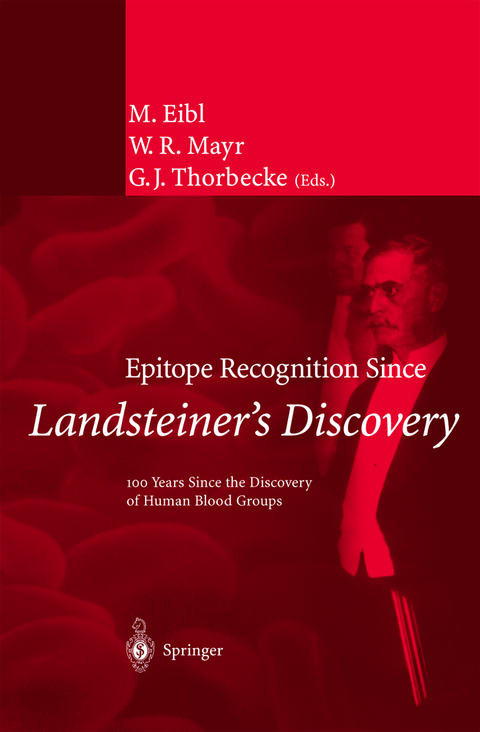
Epitope Recognition Since Landsteiner’s Discovery
100 Years Since the Discovery of Human Blood Groups
Seiten
2002
|
2002
Springer Berlin (Verlag)
978-3-540-42651-6 (ISBN)
Springer Berlin (Verlag)
978-3-540-42651-6 (ISBN)
Karl Landsteiner is best known for his discovery of the human blood goups. The revolutionary discoveries of this brilliant scientist in other fields have not received the recognition they deserve. His demonstration that poliomyelitis is transmissable showed the way of modern virology. His studies opening the field for epitope recognition, which he himself considered his main achievement, laid the foundation for research ongoing in our days. This book with its outstanding contributors is but a small tribute to this visionary scientist.
Karl Landsteiner is best known for his discovery of the human blood goups. The revolutionary discoveries of this brilliant scientist in other fields have not received the recognition they deserve. His demonstration that poliomyelitis is transmissable showed the way of modern virology. His studies opening the field for epitope recognition, which he himself considered his main achievement, laid the foundation for research ongoing in our days. This book with its outstanding contributors is but a small tribute to this visionary scientist.
Karl Landsteiner is best known for his discovery of the human blood goups. The revolutionary discoveries of this brilliant scientist in other fields have not received the recognition they deserve. His demonstration that poliomyelitis is transmissable showed the way of modern virology. His studies opening the field for epitope recognition, which he himself considered his main achievement, laid the foundation for research ongoing in our days. This book with its outstanding contributors is but a small tribute to this visionary scientist.
1 Landsteiner in Vienna.- 2 Antigen Recognition: 100 Years After Landsteiner.- 3 Induction and Suppression of an Autoimmune Disease by Oligomerized T Cell Epitopes: Enhanced In Vivo Potency of Encephalitogenic Peptides.- 4 Determination of the Expressed T Cell Repertoire: The Outcome of Competition at the Levels of Antigen Presentation and T Cell Receptor Recognition.- 5 Using Monoclonal Antibodies and Site Directed Mutagenesis to Map the Epitopes of the Blood Group Rh D Antigen.- 6 Infections and the Immune Response to Cardiac Antigens.
| Erscheint lt. Verlag | 11.4.2002 |
|---|---|
| Zusatzinfo | XX, 120 p. 35 illus., 7 illus. in color. |
| Verlagsort | Berlin |
| Sprache | englisch |
| Maße | 155 x 235 mm |
| Gewicht | 287 g |
| Themenwelt | Medizinische Fachgebiete ► Innere Medizin ► Hämatologie |
| Studium ► Querschnittsbereiche ► Infektiologie / Immunologie | |
| Schlagworte | Antigen • Antigen recognition • autoimmune disease • blood groups • Blutgruppen • immune response • Infections • monoclonal antibodies • T cell receptor |
| ISBN-10 | 3-540-42651-5 / 3540426515 |
| ISBN-13 | 978-3-540-42651-6 / 9783540426516 |
| Zustand | Neuware |
| Haben Sie eine Frage zum Produkt? |
Mehr entdecken
aus dem Bereich
aus dem Bereich
Hämatologie und Internistische Onkologie
Buch | Softcover (2023)
ecomed-Storck GmbH (Verlag)
CHF 179,95
Buch | Softcover (2024)
Urban & Fischer in Elsevier (Verlag)
CHF 73,00


